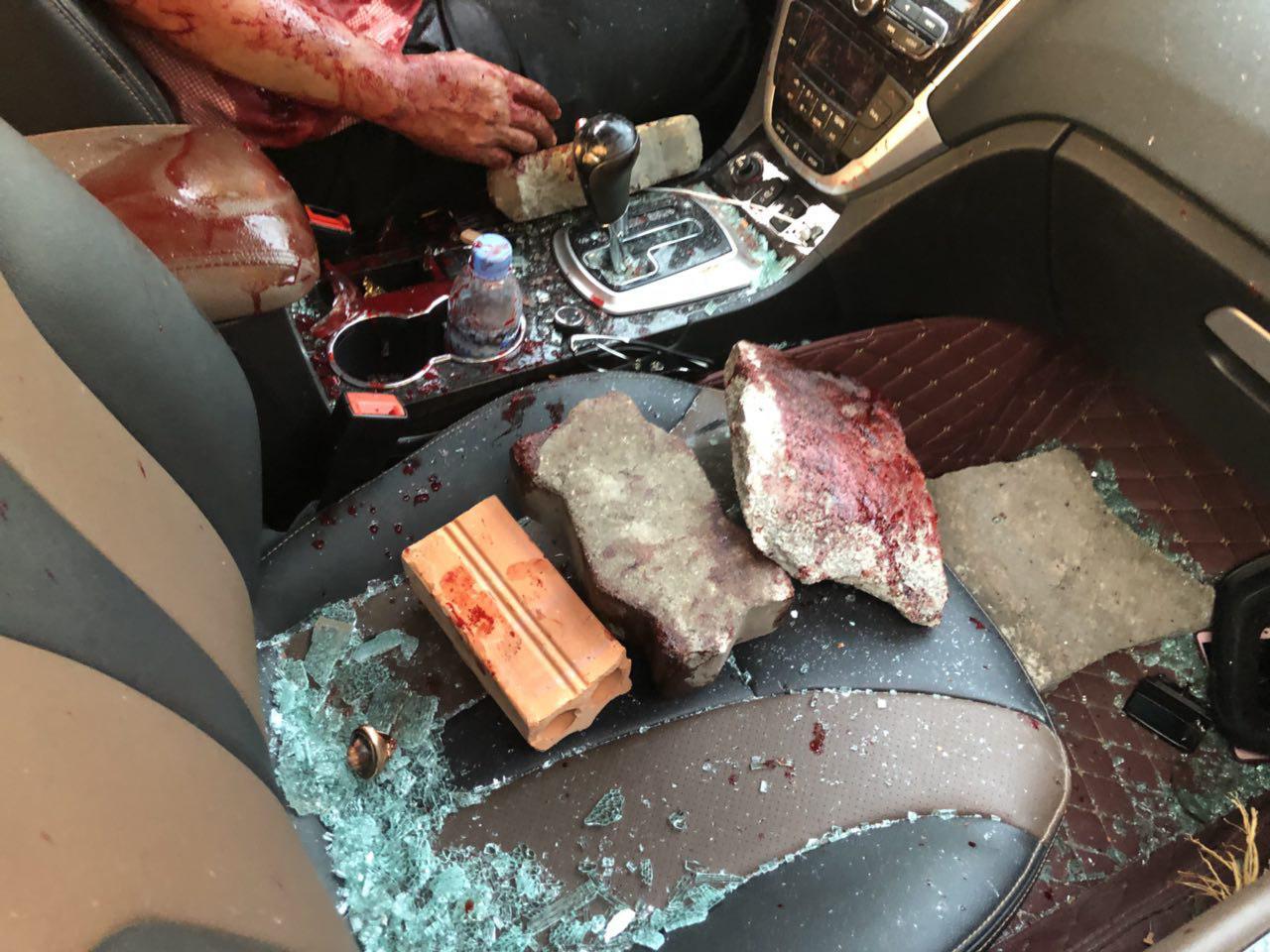
A crowd surrounds the damaged vehicle of a Phnom Penh motorist after he was set upon by a mob following a traffic accident on Sunday. Fresh News
Updated with new information: 6:44am, Tuesday March 13 2018
A university professor accused of a hit-and-run has been transported to Vietnam with serious head injuries after he was brutally beaten by a mob in Phnom Penh late Sunday afternoon.
A video of the attack shows a group of men swarming the professor’s car and throwing large rocks through his window in Tuol Kork district around 5:30pm. The driver, identified by police as Suy Sareth, 52, can be seen bashed and bloodied as he is loaded into an ambulance.
Sareth, an English professor at the University of Cambodia, sustained serious head injuries after he was mobbed, said Sem Sokunthea, deputy director of Phnom Penh traffic police.
“He was very badly injured by the mob near Preah Kossamak Hospital, and right now he was sent to get treatment in Vietnam,” Sokunthea said. “Now the criminal police are searching to find and arrest the group of people who beat him.”
Authorities said Sareth was accused of knocking a motorist from a motorbike near Wat Tuol Santevoan in Russey Keo district. Witnesses began chasing after Sareth’s car when it failed to stop at the scene, but Sareth was eventually brought to a halt and cornered by outraged residents. The victim of the hit and run has yet to be identified.

Suy Sareth, 52, pictured in his academic robes. The English professor was the victim of a brutal mob beating in Phnom Penh on Sunday. Facebook
Before the worst of the onslaught begins, Sareth, with a bloody nose, can be seen telling his attackers: “I have not crashed, I have not crashed”, before waving his hands and saying, “no, no, no”.
At that point, one man dressed in a black T-shirt, says, “Stop, stop, let the law handle it.”
The video then shows people kicking Sareth’s car, beating his head with motorbike helmets, throwing rocks at him and slamming his fingers in the car door. In the video, men can be seen speaking into walkie-talkies, but not in uniform.
Teuk La’ak II Commune Police Chief Ton Ravy said his officers were investigating the matter but had made no arrests. The perpetrators, whose faces can be seen in the footage in some cases, remain at large.
One witness, who declined to be named, was selling goods on the corner near where the attack broke out.
She said about 100 motorbikes had pursued Sareth to the scene and the crowd “almost beat him to a pulp”.
“We saw some people take rocks to beat him. We feel pity, but we could not help him, because the people, their anger exploded on him,” she said. Sareth, she added, was “on the brink of death” when police arrived.
“We should not attack him like this. This attack is very brutal . . . He is also human, even if he has crashed [into someone],” she said.
One bystander, Prak Hak, 60, said the mob was incensed because rumour had spread that Sareth had severely injured or killed someone, which ultimately proved untrue. “We were shocked when we saw the beating. We were shaking,” she said. Still, she saw an element of justice in the attack.
“If he kept quiet in the car, they would not beat him like this, but because he fought back, and was pointing back at them, that made them so angry and they beat him even more,” she said.
“It’s not only me, but other people also – when other people hit and run, we must beat them because we are angry and he does not stop. Luckily, the police came in time to save him.”

An angry mob threw rocks and bricks at a motorist who was allegedly involved in a hit and run in Phnom Penh's Russey Keo district yesterday. Fresh News
A doctor at Hong Hak Clinic, where Sareth was first taken, said he was in a “very serious condition, because people used rocks to hit him in the face”.
But Chea Lin, who identified herself as a friend of Sareth’s wife, said she had been in contact with the family and that Sareth appeared to be recovering. Although he lost consciousness en route, he regained it and began speaking again after treatment from Vietnamese doctors. “They X-rayed his brain as well, but no problem. He will get better,” she said, adding he received multiple stitches to his face and head.
Cambodian Center for Human Rights Executive Director Chak Sopheap denounced mob violence as a “despicable act” that violated the rights to life, security and a fair trial, but said such vigilantism could stem from frustration over an ineffectual legal system.
“It is very much possible that the use of so-called ‘mob justice’ results from the authorities’ constant failures to enforce the rule of law fairly and effectively, and from the public’s lack of trust in the judicial system,” she said in an email.
She noted Cambodia’s justice system was “constantly criticized for its lack of independence and impartiality” and was found to be one of the top 20 most corrupt countries in the world in a recent Transparency International report.
She said more needs to be done to prevent mob justice, such as properly equipping police forces to do their jobs effectively.
“However, this alone cannot suffice; corruption cannot be eradicated without a strict system of reporting and accountability within the public administration, and without adequate protection for whistleblowers,” she said.
Additional reporting by Erin Handley












